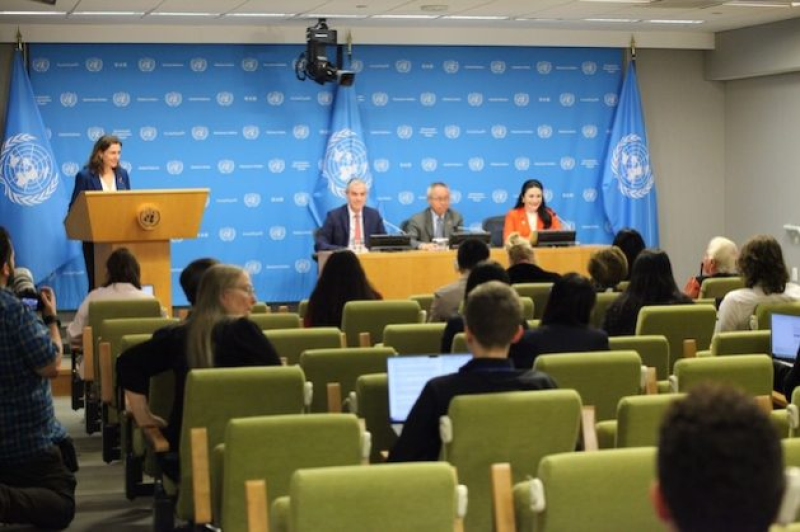- Puppet show enchants Children as Boi Mela comes alive on day 2 |
- DSCC Admin Salam’s drive to make South Dhaka a ‘clean city’ |
- 274 Taliban Dead, 55 Pakistan Troops Killed |
- Now 'open war' with Afghanistan after latest strikes |
- Dhaka's air quality fourth worst in world on Friday morning |
UNOC3 to Spotlight Ocean Science, Education, and Action

Li Junhua, UN DESA chief; Jérôme Bonnafont, France’s Permanent Representative to the UN; and Costa Rican Ambassador Maritza Chan Valverde speak at a press conference ahead of the UN Ocean Conference in Nice.
A greater understanding and appreciation of the world’s oceans are needed to protect them. As the global community prepares to convene for the ocean conference, it must also invest in scientific efforts and education that will bolster collective actions.
France and Costa Rica will co-host the 3rd United Nations Ocean Conference (UNOC3) in Nice, France, from June 9–13. Over the week, governments, the private sector, intergovernmental groups, non-governmental organisations, and others will gather to discuss urgent actions needed to promote ocean conservation and sustainable use.
This year’s conference is the first to take place during the UN Decade of Ocean Science for Sustainable Development (2021–2030). This initiative brings together stakeholders, with the UN and its partners overseeing efforts to protect the oceans’ unique ecosystems and biodiversity, while promoting greater awareness and research into ocean sciences.
UNESCO’s Intergovernmental Oceanographic Commission (IOC) oversees and tracks progress in the UN Ocean Decade, uniting the global ocean community around the principles of understanding, educating, and protecting the oceans.
An emphasis will be placed on strengthening the global system's capacity to collect ocean data. Scarcity of data and limitations in collection methods have hindered organisations from fully understanding the ocean and the changes it faces due to climate change.
Julian Barbiere, UNESCO’s Head of Marine Policy, told reporters that science-based discussions will be at the core of UNOC3. For UNESCO, this includes translating scientific facts into tangible climate actions, such as scaling up ocean-floor mapping. Currently, only 26.1% of the seafloor has been mapped to modern standards, with the goal to reach 100% by 2030.
Joanna Post, head of the IOC’s Ocean Observations and Services, remarked on the “real need for recognition” of the critical functions the observation system performs, such as weather monitoring, ocean-floor mapping, maritime security, and disaster risk management. She announced a new initiative to mobilise at least 10,000 commercial and research ships to collect and share ocean data globally.
UNESCO’s agenda also includes encouraging stakeholders to invest in and strengthen global education efforts on the ocean. “Education is key if we want to have a new generation that is aware of the importance of the ocean system,” said Francesca Santoro, a senior programme officer at UNESCO leading the Ocean Literacy office.
Santoro stressed that education should not be limited to students and young people—private investors must also understand the importance of ocean investment.
UNESCO plans to expand networks of schools and educators incorporating ocean literacy into curricula, especially at national levels. Ocean literacy helps students, educators, and communities understand the ocean's importance in various contexts.
One such programme is the SEA BEYOND initiative, in partnership with the Prada Group, which provides training and lessons to over 20,000 students in more than 50 countries. Under this initiative, a new multi-partner trust fund will be launched at UNOC3 on June 9 to support ocean education and cultural preservation projects. As Santoro noted, “For many people and local communities, the main entry point to start interest in the oceans… is in [identifying] what UNESCO calls ‘intangible cultural heritage.’”
Human activity, including pollution, “directly threatens” the health of the ocean, according to Henrik Enevoldsen of UNESCO-IOC’s Centre for Ocean Science.
He announced the development of a new global assessment on marine pollution, led by UNESCO and the UN Environment Programme (UNEP), to be launched on June 12. Enevoldsen described it as a “major leap forward,” marking the first global overview of ocean pollution.

